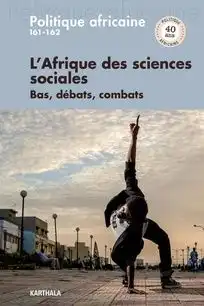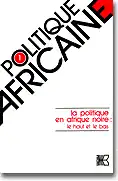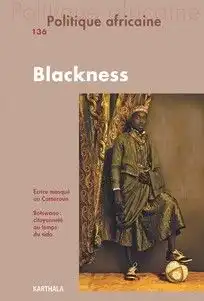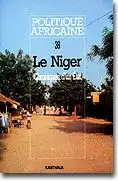Home>Celebrating Forty Years of Politique africaine. Interview with Sandrine Perrot
10.06.2021
Celebrating Forty Years of Politique africaine. Interview with Sandrine Perrot
Politique africaine is a French journal of African studies, first published in 1981. Published by Karthala, Politique africaine is a multidisciplinary peer review journal centred on the analysis of politics in Africa. Founded as a clear departure from conventional approaches on Africa, it has emerged, in France and abroad, as a reference publication. This year, the journal celebrates 40 years of existence and 162 issues. Interview with Sandrine Perrot, a long-standing member of the journal and Director of the publication.
This year, Politique africaine celebrates 40 years of existence and 160 issues! What is the genesis of this intellectual project and the journal first published in 1981?
One hundred sixty-two issues in fact!(1) The anniversary issue will be a double issue, rather exceptional because for this 40th anniversary, no fewer than 25 authors, invited by the journal’s chief editors, Vincent Bonnecase and Julien Brachet, have agreed to contribute to a reflection on “Africa and the Social Sciences: Bottoms, Debates, Battles (“L’Afrique des sciences sociales: bas, débats, combats”). This special issue will be an occasion to reflect on the debates, and sometimes even the intellectual, epistemological, and methodological battles that have permeated African studies and political sociology on Africa and that have constituted our journal. In this sense, Politique africaine has served as a witness to academic, political, and editorial evolutions that have marked the last decades.

I think that to better understand the multidimensional rupture that the “Polafian”(2) adventure represented, we should come back to the very specific context of the 1980s.(3) At the time, French-speaking African studies, marginalised as an exotic field and often forgotten by the social sciences, had to find its way between an anthropology built on the colonial conquest and the predominance of legal scholars, constitutionalists in particular, who were very present both in the academic field and in the drafting of the constitutions of newly independent states. It is also important to remember that section 40 (political science) of the French National Centre for Scientific Research (CNRS) had just been created.

Politique africaine was from the beginning a venue of very fertile intellectual debates and of conceptual innovations. The journal’s editorial committee has welcomed scholars who have driven major turns in the way the field is conceived, who have introduced new objects of research, who have taken inspiration from other disciplines. Most of all, the journal has always sought to renew its approaches and to depart from mainstream literature.
What is the particular relationship between the CERI and Politique africaine? Who are the other partners?
The CERI and Politique africaine have an organic relationship. Jean-François Bayart was a junior scholar at the CERI when he had the idea of creating a new journal and convinced to join the project not only his friends from Bordeaux and Pau but also those at the CERI who were members of the research group on popular modes of political action. Since the journal’s launch, several CERI researchers have contributed to the editorial committee: Denis-Constant Martin, Marie-Claude Smouts, Zaki Laïdi, Richard Banégas, Béatrice Hibou, Roland Marchal, Laurent Fourchard, and me...
The CERI’s support has been continuous, as has that of the CEAN (today the LAM) and now of the Institut des mondes africains (Imaf), two other research centres that have welcomed the journal’s editorial debates, and also—importantly—that have offered editorial assistance in the preparation of the journal.
We should also remember that Politique africaine is not an institutional journal, but a scientific associative journal that could be called a public-private partnership between the Association des chercheurs de Politique africaine (ACPA) and the Éditions Karthala, who are co-owners of the journal. This adventure could not have flourished without the intellectual companionship of Robert Ageneau and of the publisher, Karthala, which had just been created at the time, in 1980.
Despite this collaboration, the financial and staff support of the research centres and departments is essential for the journal’s survival and operation.
The Foreword to the very first issue of the journal concluded as follows: “This first issue of Politique africaine does not provide any definitive answers to the questions it raises. It only shows that we can no longer talk about African political societies in the same way as we did twenty years ago, and it outlines some new avenues for reflection. Let us immediately set aside any misunderstanding in this regard. It is not our intention to constitute a school claiming a monopoly of knowledge, to form yet another chapel, sure of its objectivity and interpretations. On the contrary, Politique africaine aims to be a place of adversarial debates. But to be fruitful, such a debate must above all be based on a better empirical knowledge of the facts: those from ‘above’ as well as those from ‘below’”. Forty years later, what is the current scene in the field of African studies in France?
The heuristic challenge of Politique africaine was to read Africa differently. This challenge remains while the African continent is witnessing major evolutions. “Politics from below”, the concept around which the first issue of the journal was built, has never been considered as a school of thought. This approach expressed the urgent need to renew in depth the reading of African politics by emancipating it from major currents of the times (developmentalism and dependency theory) and by offering a different perspective, closer to African societies. Politics from below was a way to revisit the political through everyday power relations and social practices, it moved away from the formalism of the exegesis of constitutions and political regimes to place African actors and local societal dynamics at the heart of the analysis. The concept has even given rise to other forms such as the study of unidentified political objects developed by Denis-Constant Martin, another founding member of the journal.(4)

In its own way, the journal has contributed to change the perspective on contemporary African societies by making it possible to consider them as any other society, in an analytical perspective that is always turned toward an intra- and extra-continental comparativism. This comparativist inclination has probably helped the journal’s recognition beyond the closed circle of specialists of the continent. But there is still much work to be done, and today the question of the relationship between area studies and global studies is still crucial, as expressed by the critics of postcolonial studies. For the journal’s 40th birthday, Politique africaine is keen to echo these debates, which are both epistemic and political.
Have there been any in-depth transformations of the journal’s editorial line in 40 years, or are some evolutions worth mentioning here?
Obviously, many things have changed in 40 years, if only in the journal’s layout and production, which has become more professional but remains, despite everything, quite artisanal, using know-how and creativity. The editorial line, on the other hand, has remained the same, aiming to be on the lookout for echoes from the field, to decentralise the perspective, to remain attentive to the actors and their practices.
During the first years, the table of contents adapted to the articles rather than the contrary. Today, the sections have stabilised around a main focus and articles dealing with other subjects. This does not prevent new sections from being created! Very recently, for instance, papers devoted to the misery and anger of teaching and research, written in opposition to the passing of the law on pension reform and the law on multi-year programming of research, will become a recurring section of the journal, on the fields of struggle in Africa. This also renews the original scientific commitment of Politique africaine.

Finally, our relationship to languages has also changed. While French remains the main language, some articles are published in English, and there are considerable efforts to translate into English some articles and even full issues, that are now available online on Cairn.
The journal is about to publish through open access all its issues from 1981 to 1998 on the French platform, Persée. What does this mean for the journal, and what is the objective?
Persée represents the third step of our digital revolution that started with the online publication of our issues since 1999, on Cairn. This digital move is an editorial upheaval that aims to circulate our work even more widely, but which has also challenged the economic model of our publisher, Karthala. The second step was the creation of our blog, which not only promotes recently published issues but also publishes additional material (posts, photos, videos, interviews) in open access. The partnership we have with Persée marks a new and long-awaited stage of the digital revolution, this time also with a view to preserving and disseminating the “Polafian” memory, making better use of it in current research and also making this patrimony available to the critical eye and sagacity of new generations of researchers. Several issues in our collection are now unavailable. We have therefore worked on gathering in our private collections a complete set of issues from number 1 to number 72.
In the same spirit of archiving, starting next month we will be broadcasting a series of video interviews which, again on the occasion of the magazine's 40th anniversary, will recount the memory of this intellectual and editorial adventure. Other surprises will be announced a little later, regarding new partnerships with the press that will help us to disseminate our research even more widely!
The 40th anniversary of the journal will also be the occasion of new encounters and initiatives in Africa. Can you tell us more?
Indeed, we want to reach out to an important part of our readership on the occasion of the journal’s 40th anniversary. This was the original idea of one of our members and future co-editor Boris Samuel. It seems to us crucial not only to improve the circulation of the work of our journal on the African continent but also to bring science to life through debates in the countries concerned and with colleagues who have been participating in the journal for a long time or who have yet to do so. Of course, this will be an opportunity to nurture our collaborations with our local partners, African universities, local and French research institutes in Africa. We have already received an enthusiastic welcome from our friends and colleagues in Côte d'Ivoire, Cameroon, and Mali. And this is just the beginning! This project is part of a reaffirmation of the journal’s permanent intellectual reinvention, also alert to the emergence of new ideas on the continent.
I would also like to add that we are proud to be setting up a new editorial team with four people in autumn 2021 that will be headed by our new editor-in-chief, Nadine Machikou from and working in Cameroon. Nadine Machikou is the Director of the Centre d’étude et de recherche en droit international et communautaire at the University of Yaoundé II and will share the editorial directorship with Boris Samuel, Séverine Awenengo Dalberto, and Sabine Planel.
What would you like to say to PhD students and future researchers in this field of study, in the current health context and in times of difficult access to the field?
First of all, I am very pleased to observe the great dynamism of current research on Africa and in Africa. A new generation is taking the lead, who is affirming itself and is becoming organised. This is visible through the vitality of the meeting of young researchers in African studies (rencontres des Jeunes chercheurs en études africaines) that take place in France every two years. Our journal and our association (Association des chercheurs de Politique africaine) have witnessed this change through a clear rejuvenation of its members in recent years.
Politique africaine was born at a time when it was necessary to banalise Africa—or Africas as Christian Coulon claimed—in order to bring the continent into the scope of the social sciences rather than leaving it at the margins as an exotic field. Today, this division of the world is not formulated in the same terms. The new generation of young students has freed itself from the disciplinary complex and has reappropriated classical notions of political science. African studies today contributes to the literature and to more general debates in political science, they have “irrigated” the social sciences and are read beyond Africanist circles, by specialists of Asia, Latin America, etc.

Politique africaine has been able to resist the system of evaluation and classification of journals by valuing originality and diversity of the objects of study, of perspectives, and of forms. But the system represents a permanent challenge for the journal. I would like to invite young scholars to decentre the focus, to take side roads, cultivate the “far end of the field”, which, as Christian Coulon mentioned, can be cultivated otherwise but “must be crossed to be ploughed”.(8) Let’s not make normalisation a uniformisation. More than ever, the current context is a call to think about what is out of range with the rigour of the social sciences.
Interview by Miriam Périer
English version by Miriam Périer and Caitlin Gordon Walker
Cover image by Richard Banégas
More info
- The journal's blog
- Link to the journal on Cairn platform
- The 40 years' issue
Notes
- 1.Many thanks to Richard Banégas and Didier Péclard, two pillars of this journal and of our association, for their reading and their comments on this text. Thanks also to Jean-François Bayart, Christian Coulon and Robert Ageneau for their captivating accounts of the genesis of Politique africaine (see the videos of their interviews, at https://polaf.hypotheses.org).
- 2.“Polafian” refers to “Polaf”, which is how Politique africaine is called by the community.
- 3.For more details see in our special issue, Jean-François Bayart, « Société civile et imbrication des durées en Afrique : un retour sur le ‘politique par le bas’ », Politique africaine, n° 161-162, 2021, p. 140-164 and Jean Copans, « Politique africaine : la naissance heureuse d’une sociabilité scientifique inédite », id., p.33.56.
- 4.See D.-C. Martin (dir.), Sur la piste des OPNI (Objets politiques non identifiés), Paris, Karthala, 2002.
- 5.D. Darbon, Réflexions sur l’africanisme en France, Report for CNRS, Paris, December 2003.
- 6.Marie-Pierre Ballarin, Richard Banégas, Emmanuelle Beauville, Pierre Boilley, Mélanie Bourlet, et al.. Les études africaines en France. Un état des lieux. [Research report] Groupement d’intérêt scientifique (GIS) Études africaines en France. 2016, https://halshs.archives-ouvertes.fr/halshs-01821660/document
- 7.R. Banégas, “Etudes africaines : l’exotisme est-il devenu banal ? Décentrement du regard, comparatisme et doxa disciplinaire”, Les Etudes du CERI, May 2015, https://www.sciencespo.fr/ceri/fr/content/dossiersduceri/etudes-africaines-l-exotisme-est-il-devenu-banal-decentrement-du-regard-comparatisme-et-doxa
- 8. C. Coulon, “L’exotisme peut-il être banal ? L’expérience de Politique africaine”, Politique africaine, n° 65, 1997, p. 95.
Follow us
Contact us
Media Contact
Coralie Meyer
Phone : +33 (0)1 58 71 70 85
coralie.meyer@sciencespo.fr
Corinne Deloy
Phone : +33 (0)1 58 71 70 68
corinne.deloy@sciencespo.fr
